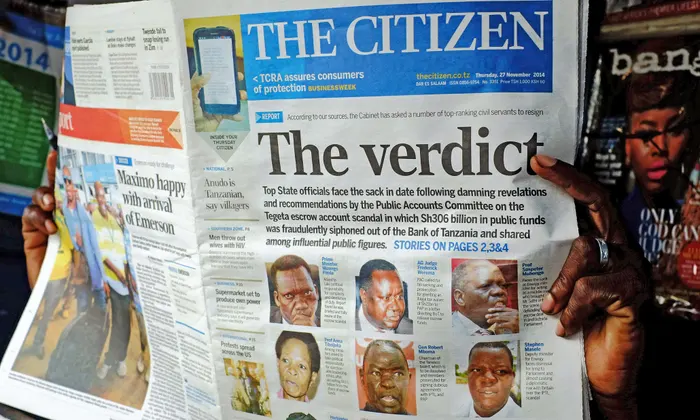Most people I know are unhappy with our judiciary. It has failed to meet societal expectations. The clamour for judicial reforms has been snowballing, but those in decision-making positions have ignored them. One reason the pace of judicial reforms is constrained is due to infrastructural inputs, but not how cases are handled in courtrooms because the political system is broken.
We have representatives who did not get their legitimacy from the electorate. As a result, they pander to those who helped them get there. Leaders who have not suffered are aloof to the plight of those victimized.
This discourse examines what is wrong with our judiciary and proposes solutions to fix it. About two decades ago, I visited the office of a fellow alumna at the University of Dar es Salaam, who was running his law firm after working for the government for some time. The real reason for my visit was to ask how he was faring and whether he trusted the judiciary to deliver justice. His answers shocked me, as I had not yet experienced the judicial corridors.
He told me quite frankly he had lost all faith in the judiciary. He said if he took a cost-benefit analysis, the nation would be better off without it. I just could not believe my ears, and that was two decades ago! I was interested to know why he had not closed shop. His response was mind-boggling. He answered that he was already closing it: he was not taking any new cases because doing so would be stealing from his clients.
Read Related: Scandal and Corruption: How Tanzania’s Judiciary Is Hijacked by Political Elites
I kept asking for more. He told me that we should stop funding the judiciary without judicial accountability. What was the point of allocating hundreds of billions of Tanzanian shillings if the courts had neither the intention of determining cases on merits nor accounting for the many judicial malpractices?
He said the recruitment of judicial officers is carried out without the input of the people of this great nation. As a result, the judiciary does not feel accountable to the people but to those who intensively lobbied for them and those they feel they will need to climb the occupational ladder. The institutional checks and balances inherited from the British colonial masters have been retained with inadequate reforms.
If a magistrate or a judge messes up a case, the affected party’s relief is to appeal. Still, the disciplinary route is riddled with insider mechanisms fraught with defending the system that has generated those judicial officers. Today, many cases of judicial gross misconduct are swept under the carpet, making judicial officers feel no compulsion to behave aptly. The whole system is geared to protect and defend the rot that prevails there.
With societal faith in the judiciary hitting rock bottom, one ought to ask how long we will tolerate judicial malpractice, gross misconduct, and lack of accountability. To drive the point home, I will cite a few true cases in different courts.
At Kisutu Magistrate Courts, I met a woman prosecuting a case against another woman who claimed the right of the estate administrator of her deceased husband’s possessions. She accused the woman of bribing a magistrate, whom she named before me, but her name is irrelevant.
Later, she took the matter to the High Court in Dar es Salaam, where a female judge dismissed her appeal, essentially handing over all the properties the widow had earned with her deceased husband to this impostor who was not even married to her husband. The bone of contention was her claim that her husband had died intestate, meaning he had not left a written will before his untimely death.
Also, read The Acquittal of Convicted Former Arusha City Director & Two Others Puts the DPP Under Spotlight
The widow, who had enjoyed her matrimonial relationship for twenty-seven years, was confronted with a written will, which she said was forged, and her husband’s signature was not his! Nowhere in the decision did the High Court reference claims the will was forged but went on to legalize the will as a legitimate instrument for execution.
In a second case in Mwanza, a man was involved in an ancestral land dispute with a distant relative who claimed the owner had given it to him. He, too, was armed with an elaborate will. My friend disputed the will, saying his father, the landowner, was illiterate and could not have signed the will as depicted.
His distant relative was a village chairman who, illegally exercising his authority in the land committee, apportioned that disputed piece of land to himself. In the land tribunals up to the High Court, the authenticity of the written will was not investigated but was presumed to be above reproach despite depositions to the contrary!
In the third case, a criminal case, all courts, from the magistrate to the appeals court, found the accused guilty of rape and sodomy. Part of the convict’s defence was that the charge sheet did not raise the offences he was convicted of.
He defended himself by stating the charge sheet had accused him of bestiality under relevant sections of the law, but he was never charged with rape and sodomy. I attended the Appeals Court hearing, and the justice chairman of the panel remarked, “Huo siyo utetezi. Tunayo maamuzi yanayosema hilo kosa linatibika.”
In the end, his convictions of rape and sodomy were confirmed by the highest court in the land. This appellant is deprived of another hearing at the Supreme Court because it is nonexistent. It needs no reminder he is now serving life in prison without parole despite the law limiting it to 30 years.
The last case involved a High Court Judge accused of tampering with court proceedings to the plaintiffs’ detriment. The plaintiffs complained in writing to then-Chief Justice Augustine Ramadhani (now deceased), who promised to form an investigative committee. This High Court Judge was transferred two weeks later, and the matter was quietly buried.
Calls for stenographers to record court proceedings instead of magistrates and judges were promised in the past. However, nobody in the judiciary has seen the Damascus light to address the hiatus. Those who feel the court proceedings did not capture what really transpired during the hearing have no independent judicial officer to look up to. Thanks to the institutional inertia to fix the rot in the judiciary.
Many decisions delivered by the Tanzanian Court of Appeal are wrongly decided, and those affected have nowhere to turn. Think of Babu Seya and his son, who lost the appeal and a review before the Court of Appeal. Without the intervention of the African Court of Justice, they would be rotting in jail for a crime of rape they never committed.
There are many reasons for having a Supreme Court, one of which is that the Court of Appeal has been abusing judicial power for years. Most cases never reach a hearing as the justices are too lazy or incompetent to grant the parties a hearing.
While the Court of Appeal loves to showcase cases that it resolved, it does not mention cases struck out for non-existent technicalities. Politicians armed with unproductive data from the Court of Appeal are emboldened to allocate more of their budget to it.
But the truth ought to come out now that if a percentage of cases terminated on technicalities were singled out, very few cases are decided on their merits.
Perhaps more concerning is the entrenched judicial culture of judges legislating from the Bench to kill cases. Judges love preliminary proceedings to relieve themselves of the onerous task of hearing cases. They jubilantly strike cases down sometimes by rewriting the laws of the land to suit their unlawful legal positions.
Legislating from the Bench amounts to legal and judicial malpractice and anarchy, but that is what is happening right now! Judges are also notorious for abdicating their lawful jurisdiction to terminate cases. In certain cases, they bemoan the absence of the Supreme Court as a feeble excuse for not attending to legal disputes within their jurisdiction. Since the justices have been clamouring for the Supreme Court, let us honour their plea of innocence.
I recently met my old friend and asked him whether the formation of the Supreme Court would solve some of the denial of constitutional rights to be heard before the Court of Appeal.
He pensively peered at me and shook his head, intoning that the judiciary quagmire is a symptom of a much deeper and wider institutional problem: Fix the politics, get the electorate to choose the political representation, and the judiciary will fix itself. I did not engage in an altercation, but I still feel that fixing politics is more problematic than forming the Supreme Court, which I highly recommend.
My friend agreed with me only on one issue: citizens’ participation in the hiring and promotion of magistrates and judges. The practice of hiring and promoting them without seeking public input should end because it promotes a culture of judicial impunity that serves nobody.
The judiciary can play a powerful role in development, but as it is currently structured, it burdens the nation. If meaningful reforms cannot be instituted, we should consider reducing its budget because it is incompetent and serves the interests of those who intensively lobby on their behalf and those they perceive as necessary evils to achieve their personal aims.




